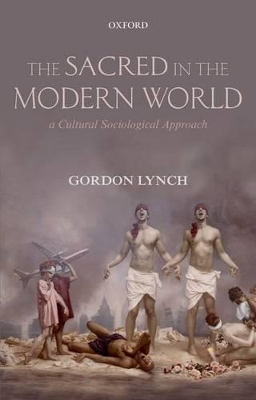
The Sacred in the Modern World
A Cultural Sociological Approach
Seiten
2012
Oxford University Press (Verlag)
978-0-19-955701-1 (ISBN)
Oxford University Press (Verlag)
978-0-19-955701-1 (ISBN)
Re-interpreting Durkheim's theory of the sacred, this book sets out a theory of the sacred for use across a range of humanities and social science disciplines and draws on contemporary case study material to show how sacred forms - whether in 'religious' or 'secular' guise - continue to shape social life in the modern world.
It is often claimed that we live in a secular age. But we do not live in a desacralized one. Sacred forms - whether in 'religious' or 'secular' guise - continue to shape social life in the modern world, giving rise to powerful emotions, polarized group identities, and even the very concept of moral society. Analyzing contemporary sacred forms is essential if we are to be able to make sense of the societies we live in and think critically about the effects of the sacred on our lives for good or ill.
The Sacred in the Modern World is a major contribution to this task. Re-interpreting Durkheim's theory of the sacred, and drawing on the 'strong program' in cultural sociology, Gordon Lynch sets out a theory of the sacred that can be used by researchers across a range of humanities and social science disciplines. Using vividly drawn contemporary case material - including the abuse and neglect of children in Irish residential schools and the controversy over the BBC's decision not to air an appeal for aid for Gaza - the book demonstrates the value of this theoretical approach for social and cultural analysis. The key role of public media for the circulation and contestation of the sacred comes under close scrutiny. Adopting a critical stance towards sacred forms, Lynch reflects upon the ways in which sacred commitments can both serve as a moral resource for social life and legitimate horrifying acts of collective evil. He concludes by reflecting on how we might live thoughtfully and responsibility under the light and shadow that the sacred casts, asking whether society without the sacred is possible or desirable.
It is often claimed that we live in a secular age. But we do not live in a desacralized one. Sacred forms - whether in 'religious' or 'secular' guise - continue to shape social life in the modern world, giving rise to powerful emotions, polarized group identities, and even the very concept of moral society. Analyzing contemporary sacred forms is essential if we are to be able to make sense of the societies we live in and think critically about the effects of the sacred on our lives for good or ill.
The Sacred in the Modern World is a major contribution to this task. Re-interpreting Durkheim's theory of the sacred, and drawing on the 'strong program' in cultural sociology, Gordon Lynch sets out a theory of the sacred that can be used by researchers across a range of humanities and social science disciplines. Using vividly drawn contemporary case material - including the abuse and neglect of children in Irish residential schools and the controversy over the BBC's decision not to air an appeal for aid for Gaza - the book demonstrates the value of this theoretical approach for social and cultural analysis. The key role of public media for the circulation and contestation of the sacred comes under close scrutiny. Adopting a critical stance towards sacred forms, Lynch reflects upon the ways in which sacred commitments can both serve as a moral resource for social life and legitimate horrifying acts of collective evil. He concludes by reflecting on how we might live thoughtfully and responsibility under the light and shadow that the sacred casts, asking whether society without the sacred is possible or desirable.
Introduction: Why do we need a sociology of the sacred? ; 1. Ontological and Durkheimian theories of the sacred ; 2. After Durkheim: the development of a cultural sociology of the sacred ; 3. Dominant and subjugated sacred forms: interpreting the systemic abuse and neglect of children in the Irish Industrial School system ; 4. The mediatization of the sacred: the BBC, Gaza and the DEC appeal ; 5. Living with the light and shadow of the sacred ; Conclusion
| Erscheint lt. Verlag | 16.2.2012 |
|---|---|
| Verlagsort | Oxford |
| Sprache | englisch |
| Maße | 147 x 222 mm |
| Gewicht | 372 g |
| Themenwelt | Religion / Theologie ► Christentum ► Kirchengeschichte |
| Religion / Theologie ► Christentum ► Liturgik / Homiletik | |
| Sozialwissenschaften ► Ethnologie ► Volkskunde | |
| Sozialwissenschaften ► Soziologie | |
| ISBN-10 | 0-19-955701-2 / 0199557012 |
| ISBN-13 | 978-0-19-955701-1 / 9780199557011 |
| Zustand | Neuware |
| Haben Sie eine Frage zum Produkt? |
Mehr entdecken
aus dem Bereich
aus dem Bereich
von Athanasius bis Gregor dem Großen
Buch | Softcover (2024)
C.H.Beck (Verlag)
12,00 €
eine Geschichte der christlichen Kunst
Buch | Hardcover (2024)
C.H.Beck (Verlag)
32,00 €


